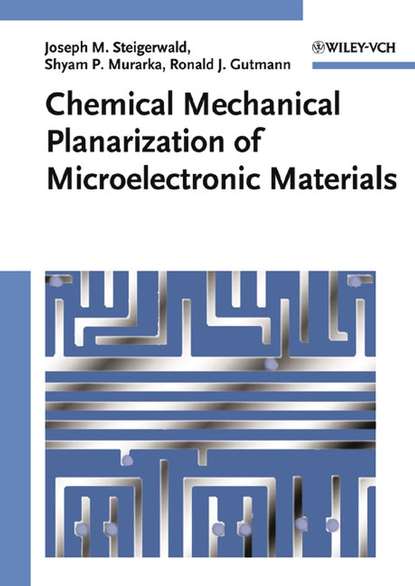
Chemical Mechanical Planarization of Microelectronic Materials скачать fb2
Joseph Steigerwald M. - Chemical Mechanical Planarization of Microelectronic Materials краткое содержание
Chemical Mechanical Planarization (CMP) plays an important role in today's microelectronics industry. With its ability to achieve global planarization, its universality (material insensitivity), its applicability to multimaterial surfaces, and its relative cost-effectiveness, CMP is the ideal planarizing medium for the interlayered dielectrics and metal films used in silicon integrated circuit fabrication. But although the past decade has seen unprecedented research and development into CMP, there has been no single-source reference to this rapidly emerging technology-until now. Chemical Mechanical Planarization of Microelectronic Materials provides engineers and scientists working in the microelectronics industry with unified coverage of both the fundamental mechanisms and engineering applications of CMP. Authors Steigerwald, Murarka, and Gutmann-all leading CMP pioneers-provide a historical overview of CMP, explain the various chemical and mechanical concepts involved, describe CMP materials and processes, review the latest scientific data on CMP worldwide, and offer examples of its uses in the microelectronics industry. They provide detailed coverage of the CMP of various materials used in the making of microcircuitry: tungsten, aluminum, copper, polysilicon, and various dielectric materials, including polymers. The concluding chapter describes post-CMP cleaning techniques, and most chapters feature problem sets to assist readers in developing a more practical understanding of CMP. The only comprehensive reference to one of the fastest growing integrated circuit manufacturing technologies, Chemical Mechanical Planarization of Microelectronic Materials is an important resource for research scientists and engineers working in the microelectronics industry. An indispensable resource for scientists and engineers working in the microelectronics industry Chemical Mechanical Planarization of Microelectronic Materials is the only comprehensive single-source reference to one of the fastest growing integrated circuit manufacturing technologies. It provides engineers and scientists who work in the microelectronics industry with unified coverage of both the fundamental mechanisms and engineering applications of CMP, including: * The history of CMP * Chemical and mechanical underpinnings of CMP * CMP materials and processes * Applications of CMP in the microelectronics industry * The CMP of tungsten, aluminum, copper, polysilicon, and various dielectrics, including polymers used in integrated circuit fabrication * Post-CMP cleaning techniques * Chapter-end problem sets are also included to assist readers in developing a practical understanding of CMP.
Чтобы оставить свою оценку и/или комментарий, Вам нужно войти под своей учетной записью или зарегистрироваться



